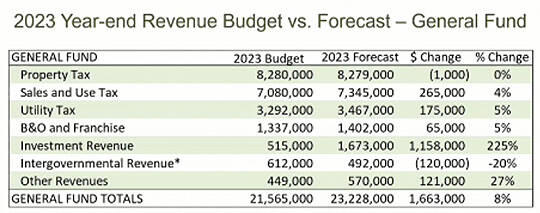A few months ago a Steering Committee was formed because of complaints that Bainbridge Island city staff and consultants were guiding the Comprehensive and Winslow Subarea plans without enough public input.
But at the BI City Council meeting Oct. 24, Councilmember Jon Quitslund made the same complaint regarding the decision to combine the Environmental Impact Statements for both plans.
“I wish we had been informed at the time the decision was made,” Quitslund said. “Rubber stamp is not the best way to do everything.”
The council also talked about the city budget at the meeting, and despite an increase of almost $8.448 million the biggest discussion was that the harbormaster position would not be filled after a retirement.
A public hearing on the city’s tax levy did not take place.
As for the budget, city Finance director DeWayne Pitts said $7.98 million is for one-time expenses. Grants and other revenue would pay $2.564 million, for a net increase of $5.883 million. The revised overall budget is over $71.578 million.
As a result of the changes, Pitts explained the net reserves are expected to drop $2.3 million to $13.4 million. He said that rate of spending cannot continue as revenues will need to increase or spending will need to drop in coming years.
The biggest changes come from: Winslow Subarea professional services, $201,200; water and sewer operation changes, $350,000; Sound to Olympic Trail grant, $1.7 million; Ted Spearman carbon offset program, $780,000; electric charging station, $160,000; Springbrook fish passage, $959,000; Country Club bulkhead, $250,000; Winslow supply well, $208,000; sewer treatment plan upgrades, $1.423 million; sewer treatment outfall extension, $700,000; Wing Point pump station, $648,000; previously approved changes, $492,000; and transfer to building, development and services fund, $561,500.
Also, the city is asking for budget increases of $201,200 and $48,859 for the Winslow Subarea and Comprehensive plans. Without the first increase, city staff fears substantial public confusion and heightened risk of appeal due to environmental impact statement issues. It could also negatively impact public involvement, a city memo says. Concerns are similar with the Comp Plan, with the addition of a recent state law that was not part of the original contract.
In explaining those costs, city planning director Patty Charnas said the two projects are moving closer together so rather than a year apart one EIS is all that is needed for Winslow and the rest of the island. She said the Winslow plan has not been updated since 2009, and the Comp Plan is a state requirement. She said the revised work plans with the two overlapping has led to more community engagement.
The Steering Committee was formed, being made up of three council and three Planning Commission members, to ensure public involvement. But Quitslund said he still feels in the dark regarding the framework and content of the EIS. “What kinds of impacts are we most concerned about?”
With so many unknowns, he said it’s hard for the council to make decisions on certain forms of development, such as housing, commercial and transportation. Of the Comp Plan, he said there are “good bones, but we need to go further.” City code also needs work, especially design standards. “People need to know what’s going to happen,” he said. “Things done less publicly are open to more sniping and raising questions.”
Councilmember Kirsten Hytopoulos mentioned concerns about not having a harbormaster.
City manager Blair King said a new position in the city’s Police Department will take over many of the duties, and that will “keep a boat on patrol more often.”
Police chief Joe Clark said that’s because the marine officer also is assigned to patrol. With the change, an officer will now have more time to walk along the city dock and waterfront, spend more time with boaters on the water, do more safety inspections and deal with paddle sports that are growing in popularity in places like Blakely Harbor.
King said the public liked how the harbormaster was an ambassador for the city, and that the city is trying to figure out a way to handle that more-social aspect of the position.
He also mentioned his office has been working with liveaboards and helping them obtain social services, and even an address or post office box, something they didn’t use to have.



